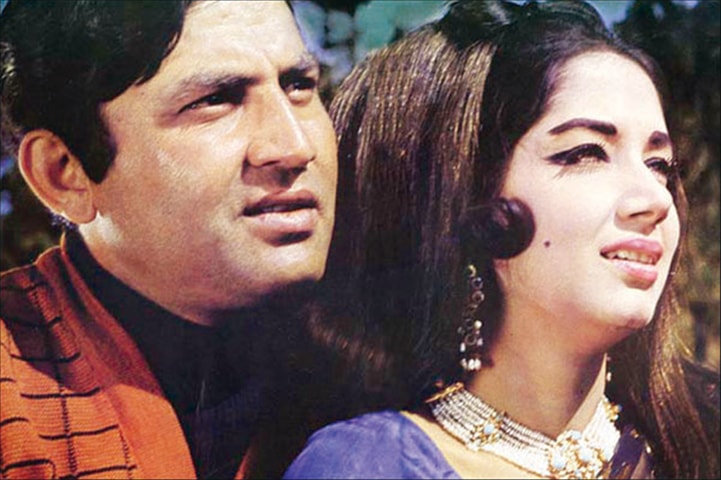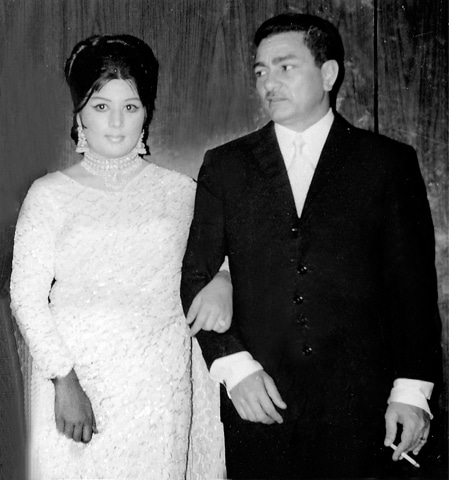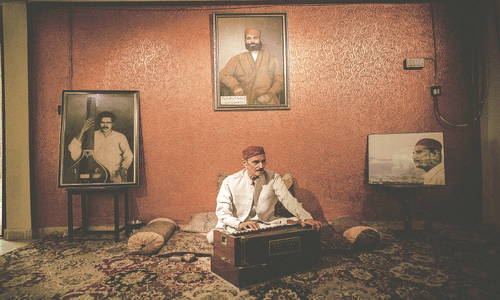
Hit silver-screen couples in entertainment industries all around the world have always had a huge number of admirers because of their sparkling chemistry on celluloid. There have also been those who got to know each other in the field of filmmaking, fell in love and their relationship culminated in marriage. Pakistan’s film industry is no different.
In the heyday of Pakistani films, the on-screen couples of Santosh Kumar-Sabiha Khanum, Darpan-Neelo, Waheed Murad-Zeba and Nadeem-Shabnam contributed to countless hit films at the box office. A lot has been written about their amazing body of work and on-screen chemistry. But sometimes the real chemistry took place off-screen, between different sets of actors. With Valentine’s Day approaching, here’s a peek at how the legendary real-life couples of film met on the sets and spent the rest of their lives together.
Santosh and Sabiha

Santosh Kumar (real name: Syed Musa Raza) was considered the backbone of the Pakistani film industry in its early days. Well-educated, tall, smart and with a deep voice, Santosh was the first leading man credited with back-to-back hits. Although he started his film career in 1947 with the film Ahensa in pre-Partition India, he went on to establish himself as the star of Pakistani cinema with Masud Pervez’s 1950 film Beli. Sabiha also made her silver screen debut with a small role in the same film.
The already married Santosh worked with the beautiful Sabiha in many films. They performed a variety of roles in Do Aansoo (1950), Ghulaam (1953), Inteqam (1955), Qaatil (1955), Sarfarosh (1956), Waada (1957) and Saat Lakh (1957), all of which were hits. They soon became the most sought after romantic pair. They eventually got married on Oct 1, 1958 during the shoot of J.C. Anand’s film Hasrat. Santosh died in June 1982, but Sabiha continued to work till the late ’90s until she moved to the US where she now resides with her daughter.
With Valentine’s Day around the corner, Icon gives a heartwarming account of romantic reel-life couples’ transition to real-life couples
Darpan and Nayyar

Santosh’s younger brother Darpan (real name: Syed Ishrat Abbas) found success late in his film career. After Saathi (1959), Saheli (1960), Gulfam (1961) and Aanchal (1962) became hits … a romantic star was born. Making a place in the industry in the presence of Sudhir and Santosh was no mean feat. Around the same time, Nayyar Sultana (real name: Tayyaba) was cast as the female lead opposite Santosh (Ghoonghat), Darpan (Saheli) and Habib (Aulad).
The hazel-eyed Darpan was attracted to the simple-looking and shy Nayyar, and their romance culminated in marriage during the shooting of Baji. He had to call his wife baji in the film, directed by Darpan’s younger brother S. Suleiman. The film released on May 3, 1963, five months after they tied the knot on Dec 1 the previous year. Nayyar Sultana, like Sabiha, stopped acting for a limited period but when Darpan was no longer being cast as the male lead in the late ’60s, she returned to films and continued acting in supporting roles till her death in 1992. Darpan died at the age of 51 in 1980.
Shabnam and Ghosh

The year 1962 is not only famous for the marriage of Darpan and Nayyar Sultana, it also saw the entry of four future stars: Muhammad Ali and Zeba Begum (real name: Shaheen) started their career with the film Chiragh Jalta Raha in West Pakistan while music director Robin Ghosh and Shabnam debuted in director Ehtisham’s Chanda in what was then East Pakistan (now Bangladesh). Shabnam would go on to rule the film industry for two decades and her jorri with Nadeem surpassed all other romantic pairs.
As Shabnam (real name: Jharna Basak) started working in films from East Pakistan, Ghosh started composing magnificent tunes for movies made in the Eastern wing. After the success of Chanda and Talash, she was asked to try her luck in West Pakistan.
Shabnam was not confident of moving to West Pakistan. Contrary to popular belief, her Bengali accent had nothing to do with it. The Dhaka film industry people were more professional in their approach than those in Lahore. There was an impression that the Lahore industry was ruled by a ‘mafia’ and Shabnam was not ready to move to Lahore alone. At the time, she was living in the annexe of Robin Ghosh’s bungalow and they also liked each other. They got married on Dec 21 1965 and moved to Pakistan in 1966 where Shabnam was cast in Rafiq Rizvi’s Anjanay Raastay, but the film got shelved. Waheed Murad was producing Samandar at the time which was directed by Rafiq Rizvi Bapu. He asked Bapu if they could use Shabnam and she ended up being cast in Samandar.
Shabnam and Ghosh shuttled between the two wings but after the fall of Dhaka, they shifted to Pakistan. The films they were associated with are considered all time classics: Ehsaas (1972), Sharafat (1974), Chahat (1974), Aaina (1977), Bandish (1980), Nahin Abhi Nahin (1980), Aahat (1982) and Dooriyan (1984) among them. They remained married for over 50 years and Robin Ghosh passed away on Feb 13, two years ago. He received six Nigar awards for Best Music Director in his career.
Muhammad Ali and Zeba
Fazal Ahmed Karim Fazli’s Chiragh Jalta Raha made Zeba an overnight star and the tall and burly Muhammad Ali started off with mostly negative roles due to his deep and resonant voice. While Zeba appeared as the leading lady opposite Darpan, Kamal and Waheed Murad, Ali was also slowly climbing the ladder of success and within two years his transition from villain to hero came with Riaz Shahid and Jameel Akhtar’s Khamosh Raho.

Muhammad Ali used to help Zeba rehearse her lines during their first film in 1961. Zeba was, she says, impressed with his honesty and straightforwardness, and in 1966 romance blossomed between them while they were working on Iqbal Yousuf’s Tum Mile Pyar Mila. They got married on Sept 29, 1966 at film star Azaad’s Karachi residence. They continued to work together for over a decade in Lollywood, and they were last seen together in the 1989 Bollywood film, Clerk.
When Zeba married Muhammad Ali in 1966, she was already working with Waheed Murad in director Pervez Malik’s Ehsaan. In an interview of Pervez Malik published in Dawn in the 1990s, the director recalled that Waheed Murad’s exact words on receiving the news of the Ali-Zeb marriage were ‘another Elizabeth Taylor in the making’.
Zeba was married to Sudhir before her marriage to Muhammad Ali. Although she had worked with Darpan, Waheed Murad, Kamal, Ratan Kumar and Sudhir before, afterwards she only appeared opposite Muhammad Ali in films. Her association with Waheed Murad also suffered as a result of this decision with whom she had worked with in eight films as the female lead, from 1964 to 1967, namely Heera Aur Patthar, Kaneez, Eid Mubarak, Arman, Ehsaan, Insaaniyat, Maa Baap and Rishta Hai Pyar Ka.
Muhammad Ali’s death in March 2006 broke their 40-year union but the story of their undying love is still alive.
Riaz and Neelo

Riaz Shahid, the legendary writer known for meaningful concepts and patriotic films, married the ravishing and sultry film star Neelo (real name: Cynthia Alexander Fernandes) under circumstances no less intense than a Riaz Shahid film. In March 1965, the Shah of Iran was on an official visit to West Pakistan. The Nawab of Kalabagh, the then Governor, asked Neelo —who was then at the height of her popularity — to dance before the Shah. Allegedly, armed persons were even sent to her home to abduct her, yet she resisted and attempted suicide on the way to the Governor’s House. She was taken to a hospital where doctors managed to save her life. The film fraternity got involved and shut down work at the film studios for a day while the media gave the incident extensive coverage.
Leftist poet Habib Jalib immortalised the incident in his poem:
Too ke nawaqif-i-aadab-i-shahenshahi thee
Raqs zanjeer pehen kar bhee kiya jata hai

Impressed by her bravery, Riaz Shahid proposed to Neelo and they got married in 1965 after she converted to Islam and changed her name to Abida Riaz. The husband-wife duo made a film Zarqa on the Palestinian issue in 1969, where Riaz used Habib Jalib’s poem, showing an ‘angraiz’ (foreigner) asking the leading lady (played by Neelo) to dance against her will. The film was a box office success and became the country’s first diamond jubilee film. Riaz and Abida even named their first born Zarqa. Riaz Shahid died of blood cancer in October 1972. It is believed that he could not bear the treatment meted out by the ruthless editing of his film Yeh Aman by the censor board. Superstar Shaan Shahid is the son of these two legends, who was a mere infant at the time of his father’s death.
Rambo and Sahiba

John Rambo may have been the title character of the Hollywood action series played by Sylvester Stallone, but in Pakistan Jan Rambo is one of the most celebrated film comedians. Afzal Khan became famous due to his character of a sweeper named Jan Rambo in the comedy TV series Guest House and soon made his way into films. His path crossed with an upcoming star Sahiba (real name: Madiha), daughter of a yesteryear actress Nisho, and they immediately fell in love with each other. However, Afzal Khan had to prove himself when he had to fulfill conditions laid down by his mother-in-law before they could wed. Eventually, they got married on Oct 16, 1998, and have now been together for almost two decades.
Published in Dawn, ICON, February 11th, 2018


































